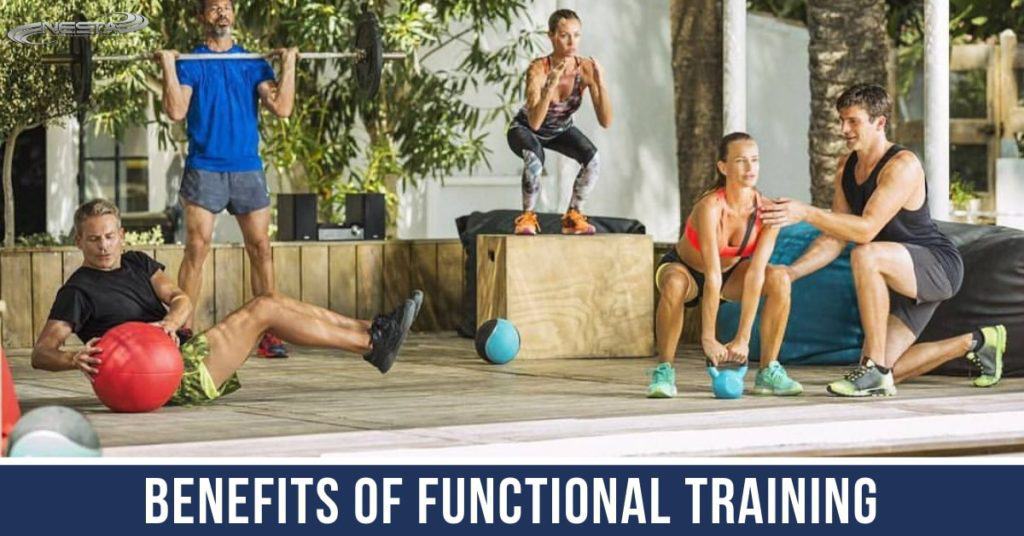Benefits of Functional Training [ UPDATED 12/23/2019 ]

Functional training is one of the top fitness trends, and definitely worth your attention (especially if you have plans to grow your client list this year.) But what makes one program more “functional” than the next? Is functional training effective?
What is Functional Training?
Functional strength training focuses on compound movements that work out more than one muscle group at the same time. When you strengthen your biceps using an exercise like biceps curls, you’re only focusing on a single muscle. This may build strength or endurance, depending upon the weight you use and the number of reps, but it’s an isolated exercise.
Why functional training is important?
Like other training programs, functional fitness is great for the health of your body. It helps you build strength, power, and mobility that translates beyond the gym.
Want to try it for yourself? Here’s what functional fitness is all about and the benefits of functional training
1. Functional Fitness Programs Can Increase the Ease of Everyday Movement
By improving the overall function of your body, boosting muscle strength and endurance, and developing muscle and body stability everyday activities can be completed with more ease. Compared to conventional workouts, the benefits of functional fitness tend to out-weigh everything else because it’s actually targeting the movements we are doing every day.
2. Functional Fitness is Low Impact
Because functional training implements exercises that are low impact, it’s a great starting point for anyone at any fitness level to try. For newbies starting out with a different workout or fitness style, it can be really hard knowing what is going to work best for your needs, but the functional movement will help to improve all your physical abilities without causing stress to your body and joints.
3. Increases Flexibility, Coordination, Balance & Posture
The range in the motion of functional exercises are quite large, and you need to start and finish in a position where your muscles are stretched. One of the primary goals of functional movement and training is to offer resistance. Implementing its exercises and programs works in boosting your body’s functional strength by increasing overall flexibility and coordination. As your range of motion is enhanced, you’ll find day-to-day activities become easier.
The exercises implemented through functional fitness and training use multiple muscles to enhance your strength and balance, effectively improving your overall posture. Many functional training exercises are not stabilized and require you to use other small muscle groups to help support the larger ones, which will help prevent over-training one muscle group which often leads to incorrect posture.
4. Can Help with Your Joint Pain
For those that suffer from regular back, muscle and joint pain functional movement and training can be incredibly beneficial. Best known for bridging the gap between personal training and physical therapy, functional fitness and training are designed to restore your body. Because of this, chronic back, knee, neck and joint pain can all be significantly reduced. The exercises used in functional movement and can make daily tasks that were once hard, much more possible.
5. Reduce The Risk of Injury
Functional training stands out from conventional training because of its way to reduce the risk of injury and stress to your body. Everyday movements can leave runners and sports enthusiasts in pain. By mimicking common movement patterns, your body is better able to cope with daily physical stresses. When training, muscles aren’t just strengthened but the surrounding ligaments too, which is the area that can often become injured.
6. Functional Training Builds Muscle
So, can functional training build muscle? Functional movement training doesn’t just strengthen one muscle group at a time. Rather, it works and trains several muscle groups at once. As a result, you build strength holistically, forcing your body to function as a single unit.
Starting Your Training Career
Now it’s your turn to take action. Did you know that most fitness careers don’t require formal education or a degree? Learn more about the variety of fitness industry careers.
There is always something exciting about earning a new training or coaching certification and applying that new knowledge of how you train your clients. This also helps you hit the reset button.
Learn more about becoming a Functional Fitness and Training Specialist and gain the focus that helps you build unstoppable confidence.
The countdown is on for the busiest fitness season of the year. Use these strategies to make sure you’re doing everything possible to make it the most successful year yet.
Thanks for reading!
The NESTA/Spencer Institute Team
PS: Click here to see many helpful business/career resources






